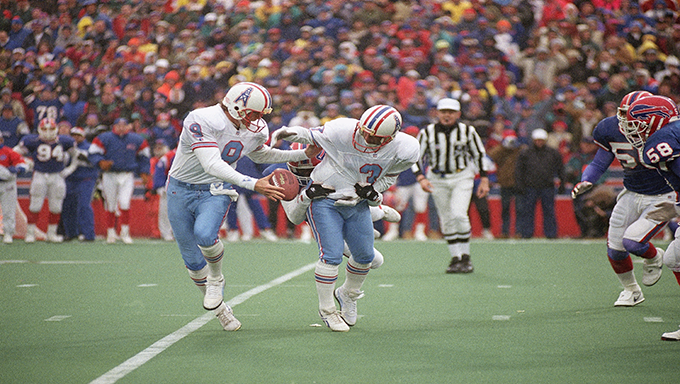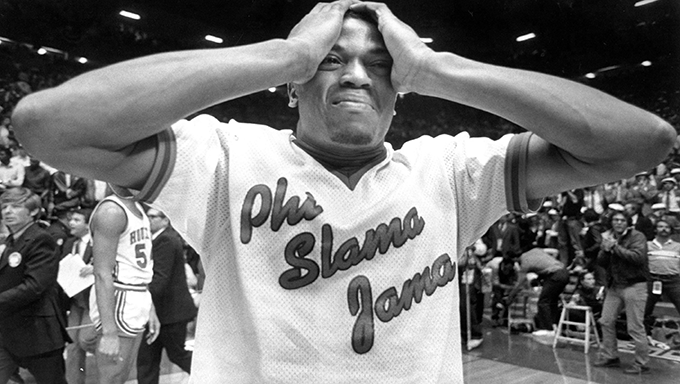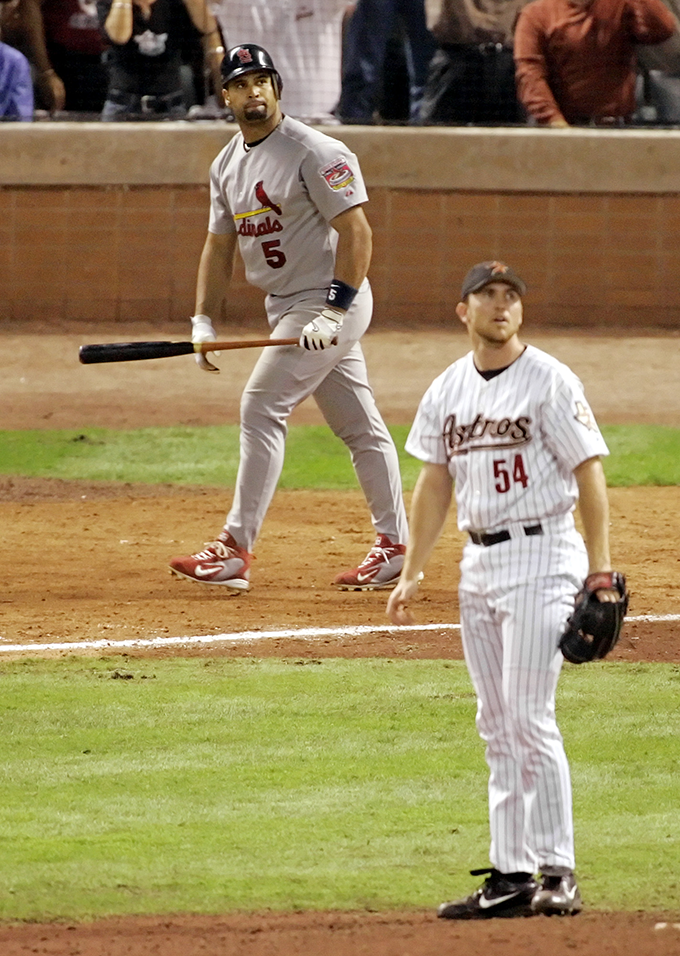
Well, here we are, twenty years on from Houston’s last professional sports championship, with a reunion of the back-to-back Houston Rockets NBA title-winning teams. The gang all showed up to celebrate those palmy, giddy days of 1994 and ’95: The Dream and the Glide; Big Shot Bob Horry and Mario “Kiss of Death” Elie; Otis Thorpe and Mad Max. These were the heroes who transformed Houston for a brief shining moment from Choke City to Clutch City. Ah, to reflect on the moment the city hosted champions. To paraphrase Clyde Drexler: How sweet it was!
And that sweet moment was just that: fleeting. Up until that two-year prime of the mid-nineties, Houston’s sports history had been an unrelenting nightmare, defined by long periods of mediocrity and/or ineptitude, front-office incompetence, and cruel (or bizarre) tragedies. And since 1996? Somehow, astoundingly, Houston’s athletic fortunes have been even worse than they were in the run-up to ’94–’95. The Rockets have not made it back to the finals. The Astros were swept in their one and only trip to the World Series, in 2005. Our baseball team was forced to move to the freaking American League in 2013, where they set the bar for mega-tanking. The Astrodome has been shuttered and now steam-bakes, silent and forlorn, in the humidity. The Summit, the Rockets old home and the site of their Golden Age, was turned over to Joel Osteen in 2003, who made it the home of Lakewood Church, a super-duper megachurch. Our beloved Oilers left for Nashville in 1998, replaced by a team even more inept on the field and infinitely blander. (The coaches don’t get in fistfights! Front-office guys don’t drunkenly moon wedding parties! No tickets are left for Elvis at will-call!)
There are lots of lists of saddest, most tortured, and most miserable sports cities out there. Houston makes all of them, but never tops them. Even when it comes to losing, Houston can’t win.
But all of these lists are wrong. As a 45-year-old lifelong fan of Houston sports teams, I am here to tell you that no American town has endured more athletic misery than the Bayou City.
Nope, not even you, Cleveland.
Don’t get me wrong, Ohioans: I say that with respect. You know what it’s like to piss away NFL playoff games in dramatic fashion. And in losing the Browns to another city, you can feel our pain there too. And, yes, the nu-Browns are even worse than the Texans. But as Jerry Seinfeld once put it:
Loyalty to any one sports team is pretty hard to justify, because the players are always changing; the team could move to another city. You’re actually rooting for the clothes when you get right down to it.
Yes, both the Browns and the Oilers moved. But you got to keep your clothes. We did not. And what a shame, for the Oilers’s Columbia-blue uniforms suggested our city’s blue-collar essence (as did coach Bum Phillips and Earl Campbell, those East Texans who became great exemplars of Houston’s KIKK-up truck drivin’, longneck-swillin’, belt buckle–boastin’, ten-gallon hat–wearin’, Gilley’s Saturday night Urban Cowboy heyday).
Plus you got your Browns back, Cleveland. You got back your Dawg Pound and your two-fisted, Joe Six-Pack Rust Belt mystique. Our Gulf Coast answer was taken away forever. Instead, we got the Texans, a vanilla corporate team with a generic name and uniforms and a hokey bull logo that harks back to Houston’s imaginary cowboy heritage and a theme song written by Rage Against the Machine.
And let’s talk history, Brownies. Your team was an NFL juggernaut back in the fifties and sixties, back when the Oilers were either nonexistent or winning cute little AFL championships in a high school stadium.
As for other sports, yes, the Cavs have been a C-franchise over the course of their existence, but you had (and now have again) Lebron James, which makes you a far more legit contender to make the NBA finals out of the Eastern Conference than the Rockets are in the west. On the diamond, the Tribe won it all in 1948 and 1920, so you can hang your racially offensive caps on that. And when the Indians lost the World Series in 1995, your guys at least took the Atlanta Braves to six games.
Cleveland, you are number two, I will grant you that.
But Atlanta? How are you worse than Houston?
Forbes consistently ranks Atlanta atop its sports misery list, and it’s hard to see how its credentials outshine Houston’s.
Since moving to Georgia, the Braves have snagged five pennants to the Astros’ one, and while it’s true they have lost all but one of those World Series, the key phrase is “all but one.” The Astros have not won so much as a single World Series game over their entire 53-year existence.
The Falcons have been to a Super Bowl, and the Hawks, while owning zero titles and presenting perhaps the most blah historical image in all the NBA, are as good a bet as any to win the championship this year.
Buffalo? Please.
Where most of the country sees that name and thinks of repeated ineptitude on the big stage, Houston regards it with chilly, clammy-palmed dread. For us, the Bills conjure scenes of downright operatic tragedy and Stalingrad-level collapse.
I speak, of course, of the events of January 3, 1993, also known as the AFC Wild Card Game, played in Rich Stadium on the windswept shores of dreary Lake Erie. Like a Civil War battle, its victor today knows it by one name (the Comeback), while its vanquished call it another (the Choke.)
We all have our stories of that gray and gloomy January day. Here’s mine. I was house-sitting for my dad in Nashville, watching the game with my English girlfriend. This was her first American football game. As the Oilers rolled out to that 28–3 lead and halftime came around, Dad phoned in from Florida, where he and my stepmother were vacationing.
Like me, Dad was merrily sozzled. “This is too easy,” he said. “I mean, it looks like practice out there.” Much chortling and guffawing ensued on either end of the line, then Dad rang off, and the Oilers resumed punishing the Bills in the second half, scoring another quick TD to go up 35-3.
With both starting QB Jim Kelly and star running back Thurman Thomas banged up on the bench, and that lead, a Houston radio announcer crowed, “The lights are on here at Rich Stadium. They’ve been on since this morning. You could pretty much turn them out on the Bills right now.”
Alas and alack, not so much.
Through flubbed Oilers kicks, turnovers, a surprise Buffalo onside kick, Oiler offensive ineptitude, cheating (Don Beebe ran out of bounds and back in on one TD play), a freak bounce here, and a lucky break there, the Bills erased the Oiler lead and won 41–38 in overtime.
I kept trying to explain to my girlfriend how unusual, how downright unprecedented, how utterly Oiler-ish the collapse was, how her first game was a grand catastrophe of downright biblical proportions. “Imagine if England was beating Germany 4-0 in the second half of a World Cup match and found a way to lose,” was about the best I could do.
Dad never called back from Florida. While his Oiler love survived, as did mine, I’ve read two stories online of sons recalling that their dads either gave up on football after that game or merely ended their allegiance to the Oilers.
Nope, none of you cities can say you have it worse than Houston. Need further proof? Happy to oblige.
ON- AND OFF-FIELD (AND COURT) TRAGEDIES
The Oilers got off the mat after the disastrous Bills game, and the next year roared into the playoffs with a 12-4 record and an 11-game winning streak. But, true to form, they choked again, this time at home, losing to Joe Montana’s Kansas City Chiefs team. Those Oilers were coping with the recent loss of teammate Jeff Alm, who blew his own head off with a shotgun after killing his best friend in a drunken wreck on the Southwest Freeway just before the playoffs commenced. The story has spawned a persistent, and persistently discredited, urban legend, but even the established facts put it squarely within the realm of Houston’s excessive number of bizarre sports deaths and tragedies.
Yes, all franchises have their share of premature, career-ending injuries, and Houston teams are no exception. Yao Ming’s foot and Ralph Sampson’s knees burned out long before their time; Earl Campbell’s hell-bent-for-leather running style guaranteed a short career; many a golden-armed Astro has thrown out his shoulder or popped an elbow ligament in his twenties. Such are the breaks.

But how many other baseball franchises have lost one ace pitcher (J.R. Richard) to a career-ending stroke at the age of thirty, and another (Don Wilson) to death via a bizarre carbon monoxide poisoning incident? How many careers as promising as that of Dickie Thon—a prototype of the power-hitting A-Rod/Nomar shortstop—have been snuffed out as early as his by a beanball to the face? (Snuffed out is not really accurate, as even with his vision wrecked in one eye, Thon was able to perform as a serviceable player for years afterward. Which just speaks to how much talent he had before he was half-blinded by that former Red Sox goat Mike Torrez, fie upon his name forevermore.) How many basketball teams have seen their beloved star forward’s career derailed by a devastating on-court punch to the face, as with Rudy Tomjanovich? And cocaine helped derail a potential Houston Rockets dynasty in the eighties. With Mitch Wiggins, Lewis Lloyd, and John Lucas falling prey for a time, Grantland recently branded them The Greatest Team That Never Was.
That same decade saw the Astros on the losing end of two of the greatest National League Championship Series ever, the destruction of our beloved exploding Astrodome scoreboard at the insistence of money-grubbing Bud Adams, and the tail-end of the Luv Ya Blue era, when the Oilers came up just short against the roided-out Pittsburgh Steelers time and time again, the second time thanks in part to Mike Renfro’s catch/non-catch, one of the most controversial nullified touchdowns in NFL history.

A BRIEF, INTENSELY PAINFUL DETOUR INTO COLLEGE SPORTS
The eighties were also the last years of the University of Houston’s Guy V. Lewis basketball dynasty, with the team’s star burning brightest just before it exploded into nothingness. The Cougars made it to three consecutive Final Fours, coming up short each time, most heart-breakingly in 1983, when the inexperienced Hakeem (as he was then known) Olajuwon forgot to box out NC State’s Lorenzo Charles, whose last-second rebound/dunk of Dereck Whittenburg’s half-court airball was one of the most emphatic and merciless endings to any championship game in any sport in American history. Watching it was a judge sentencing you to death and then personally executing you from the bench right then and there. There was no chance at a pardon nor a reprieve, no prayer for a long-range three. Airball, dunk, Wolfpack pandemonium, and it was over for Clyde Drexler, Olajuwon, Michael Young, Benny “Instant Offense” Anders, Larry “Mr. Mean” Micheaux, and the rest of one of the most athletic, acrobatic, and jaw-droppingly talented college teams of all time.
As for the football Cougs, probably their most prominent moment on the national stage was their second-half meltdown against Joe Montana’s Notre Dame team in the 1979 Cotton Bowl. A flu-stricken Montana lead the Irish to 23 unanswered fourth quarter points and a 35–34 win, a collegiate precursor for the Oilers-Bills debacle 14 years and two days later.)

DID I MENTION THAT WORLD SERIES MESS? I DID? BUT, OH, IT’S SO BAD, I HAVE TO MENTION IT AGAIN.
The Charles dunk was as much a George Foreman right hook to the solar plexus as Albert Pujols’s gargantuan home run off of Brad Lidge in 2005. Yes, the Astros rallied days later and won that series and finally made it to the World Series that year, but that one titanic blast seemed to mortally wound the whole team. They limped into the series whimpering like a kicked puppy. Lidge was certainly never the same and had to leave Houston and undergo years of sports therapy to get back even a portion of his once invincible mojo, especially after he followed the Pujols debacle with a disastrous World Series, in which the Astros served as nothing more than slumpbusters to the benighted Chicago White Sox. Up to that point, the Chisox had not taken home the flag since the nineteen-teens. Leave it to the Astros to end an 88-year drought.
AND SINCE I BROUGHT UP GEORGE FOREMAN.
The champ from Fifth Ward’s defeat at the hands of Muhammad Ali in the Rumble in the Jungle was yet another example of a Houstonian on the losing end of a huge upset. Foreman has since claimed he was drugged and that Ali’s trainer loosened the ropes, thus allowing Ali to lean way back and absorb the powerhouse body blows from Foreman that had so recently pulverized Ken Norton and Joe Frazier in two rounds apiece. So, as with the Choke/Comeback and the Renfro Catch/Non-Catch and the Steroid Curtain Steelers, there is talk of the Houston side going up against more than just the normal opposition. (Sigh. Sorry. You get whiny and conspiratorial when you’ve been a loser for so long.)

Even when Houston does win, as with the mid-nineties-era Rockets, nobody gives us full credit. Outside of Houston, you hear all this crap about how those two championships—our city’s sole legit professional sports titles—should “come with an asterisk, because Michael Jordan was off playing baseball.” That is, they are as tainted as Barry Bonds’s home run records, Michael Strahan’s single-season sack record that had been gifted to him by Brett Favre, or the stripping of Jim Thorpe’s Olympic gold medals because he had played a few games of semi-pro baseball. “They didn’t beat the best,” runs this tired refrain. (Oh, and Strahan is a graduate of Houston’s Westbury High School, so we get one-fifth of that list’s unearned glory!)

First off, despite what everyone says, MJ did play in 1995. Secondly, the Rockets swept the team that eliminated MJ and the Bulls from the playoffs that year. Third, in the three years before MJ went off to suck at minor league baseball, the Bulls went 1-5 against the Rockets, with Mad Max all up in MJ’s head like no other defender of that era.
But none of that matters outside of Houston. Nobody questions the legitimacy of the Mavericks’s 2011 title or the Spurs’s—what is it, like twelve, now?—championships, nor any of the Cowboys’ Super Bowl rings, while the mid-nineties Rockets, our golden boys, are still regarded as mere pretenders, even as they taught us here how never to underestimate the heart of a champion and changed us from Choke City to Clutch City.
For a couple dozen months, at least.
BONUS! MORE HOUSTON SPORTS MISERY DISHONORABLE MENTIONS
- The Astros trading away Jimmy Wynn, Mike Cuellar, Kenny Lofton, Rusty Staub, and Joe Morgan at various times for a bunch of busts, spares, and nobodies.
- That cheating punk John Stockton’s dagger of a three that ended the Rockets glory days for good in the 1996 playoffs.
- The drafting of David Carr. (That JaDaveon Clowney pick isn’t looking much better about now.)
- The Texans letter jacket debacle.
- The Rosencopter.
- Carlos Lee’s last Astros contract.
- Letting Nolan Ryan go with years left in his arm, thus forcing Houstonians to watch their beloved hero enter Cooperstown as a Texas Ranger.
- The downfall of native son and former Astro Roger Clemens’s reputation.
(Photos: AP.)






